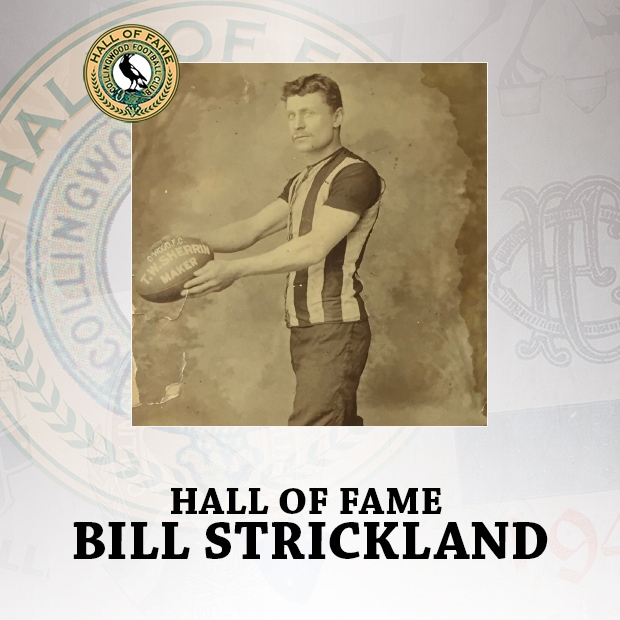Collingwood has pulled off some wonderful recruiting coups over the years, but it’s arguable if any have had the overall impact on the club of Bill Strickland.
Strickland was one of the 40 players running around Victoria Park the day the Pies played their first ever game as a senior football club, back in 1892.
The only trouble was, on that day, he was playing for Carlton.
But a year later he crossed to Collingwood as an experienced leader, where he went on to become Collingwood’s first great captain and one of the pivotal figures in the club’s early years – helping save the Magpies from early extinction and eventually piloting them to a Premiership and into the VFL.
When Collingwood first encountered Bill Strickland, he was one of the stars of the game with Carlton. He’d been there for eight years, including one as captain, having originally crossed from Brunswick.
In 1891, the Sporting Standard described him as “one of the best all-round footballers of the day”. He was a broad-shouldered, strong-limbed player who played mainly in the centre or on the ball (‘following’). He was robust, fast and a good mark, though he occasionally drew criticism for play that some observers deemed too aggressive.
Collingwood, as the newest club on the block, could scarcely have imagined that a player with Strickland’s profile could end up at Victoria Park. But there was a dispute over the captaincy at Princes Park, and Strickland became dissatisfied with both his fellow players and the committee. Both sides decided it would be better to part ways after the 1892 season.
This was Collingwood’s opportunity – and they pounced. To the surprise of many, Strickland agreed to join a team whose first season had produced only three wins, 14 losses and a draw.
Remarkably though, the VFA refused to grant him a clearance, and Strickland missed the first few games of the 1893 season. He returned in the fourth round, and the players elected him as their captain after just his second game.
Almost immediately, Collingwood’s fortunes improved – both on and off the field. Strickland returned to his best form and, by 1894, newspapers were remarking that he had “rediscovered all the dash and cleverness which rendered him one of the most accomplished of Carltonians.”
“He marks the ball every time it comes his way and never fails to kick it into the part of the field where his men are likely to make the best use of it,” said one reporter.
The move to Victoria Park reinvigorated Strickland’s career. So much so that, by 1896, during which he turned 32, he was named as Champion of the Colony and widely noted to be one of the two best players of the season.
Just as importantly, he was by that stage regarded as one of the finest and most astute captains in football. His efforts on grand final day were particularly praiseworthy, making several telling positional moves and marshalling his troops superbly on a brutally hot day.
Collingwood’s first flag owed much to Strickland’s efforts, and especially to his sharp football brain.
His leadership had proved vital to the club in other ways too.
At a time when there were no coaches and the captain played a major role in shaping a club, Strickland gave Collingwood direction and helped instil discipline that had been lacking in the first season.
He was ready to stamp his authority, even where star players were concerned (in 1895, the brilliant Dick Condon was called before the committee and made to promise to “obey the captain on the field without stopping to argue”), and in so doing set standards that underpinned the Magpie successes of the next 40 years.
Strickland had originally intended to retire after the 1896 season, but his good form and fitness convinced him to stay on to see the Magpies through their first year in the VFL. At the end of his playing career, the 1897 Annual Report said: “The place of such a fair and honest man, combining as he did the qualities of a first-class player with the ability of an able general, will be hard to replace.”
But Strickland was not lost to the game, or to Collingwood. He became Collingwood’s first official coach in 1904, having been an unofficial mentor to the team for years before. He spent more than a decade on the committee, as vice-president and VFL delegate, and also served with the Australasian Football Council and even managed Victorian touring teams.
Through this service, Bill Strickland undoubtedly earned the title of being a great servant of the game. But his time as a Magpie player and captain – and all that he did outside the playing arena – stamps him as a pioneering hero of the Collingwood Football Club.
And now, in 2017, Strickland has been confirmed as one of the finest contributors of Collingwood’s first 125 years, with his induction into the club’s Hall of Fame.
Hall of Fame inductee: Bill Strickland
Collingwood pioneer Bill Strickland was inducted into the Collingwood Football Club Hall of Fame during the 2017 season launch at the Holden Centre.


